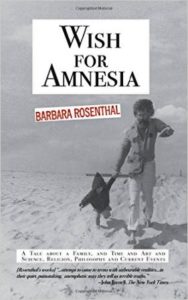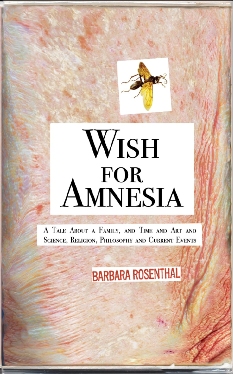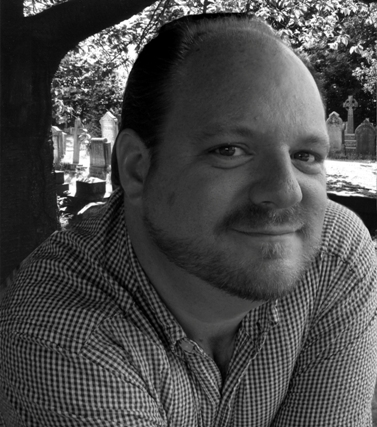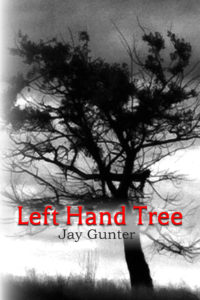Book Review: Wish For Amnesia

Title: Wish for Amnesia
Author: Barbara Rosenthal
Place of publication: New York, NY, USA.
Publisher: Deadly Chaps Press
Date of publication: November 30, 2016
Number of pages: 310
Paperback ISBN: 978-1-937739-83-6
E-Book ISBN: 978-1-937739-66-9
The Review:
Wish for Amnesia by Barbara Rosenthal starts with a flourishing and honest Foreword by Joseph A.W. Quintela, publisher, “I recognize her immediately, but it takes awhile before we say hello.” “… A work of pure rollicking fiction…” accelerates the reader’s interest. His insightful introduction to the author ensures that the novel will live up to its expectations of “this wackiest of deadly serious pieces of literature.”
The story begins with a peep into the historical background, the lineage, the tribulations and the victories that led to the conception of the protagonist, Jack Rubin. Jack enters the pages with an air of élan, an infectious smile, and cartloads of self-doubt that he masks with his magnetic personality. The first few pages set the pattern of the conflict that the protagonist endures between his schizophrenic tendencies and his ambitions — “through his person the fate of the universe could advance more near to Heaven.”
The story then introduces us to Jack’s girlfriend, Beatrice — the dark and secretive artist he shares all his dreams, fears and inconsistencies with. The author weaves the same intrigue for the readers that holds Jack riveted to Beatrice. We see how Beatrice holds her own and, more importantly, the strings of others’ lives to her whims and fancies. As the narrative progresses, her skills in people and circumstantial manipulations become the catalyst. The revelation in “Chapter 6: Jack Meets Beatrice at Kennedy Airport” is shocking! This is the very beginning of the unusual and amazing tidings that journeys — Wish for Amnesia.
The better half or perhaps the not-so-better half of Jack’s life is Caroline. She pierces the novel with her own set of inhibitions, familial issues, and guilt. The strong current of her repressed childhood and the embarrassments of her misadventures disintegrate her from a promising artist into a venomous person. Ironically, Beatrice introduces her student and aficionado Caroline to Jack. Soon we realize that the dark beauty plays a significant lead in the glorious convergence of Caroline and Jack and the eventual birth of their daughter, Jewel. Beatrice becomes the godmother of the newborn and her eventual lover.
Jewel, with her birth and increasing potential, elevates the storytelling to a high note.
She becomes the role model for many of Jack’s scientific and astronomical ventures. Caroline’s persona crumbles into a vicious, vengeful mother who is always high on marijuana. The story races through the tragedies that befall Jewel. (One of the ill-fated events will haunt the readers for a long time!). Despite all, Jewel tries to be a real jewel to her family and environment. After overcoming familial disappointment, disillusion in love, scarring by an unfortunate supernatural accident, her body is tragically ravaged by a stranger. Jewel finally succumbs to it all — in her wish for amnesia.
The tale stands out in its imagery and its tight and gripping plot. The incredible flow of the novel is not compromised even once, even though it took 38 years in creation! Barbara Rosenthal’s achievement as the author of Wish for Amnesia is exemplary. She builds an engrossing journey for each of the six characters and judiciously sees them through a befitting conclusion. The novel highlights the tyranny of World War II through the Auschwitz Concentration Camp (1940-1945), and the drama of the Vietnam War Protests (the late 1960s) and 1985 Rome Airport Attack, among other historical moments, beautifully intertwine in the storyline. The book further glimpses at black magic, the search of extraterrestrial beings and the advent of computers. It also touches the delicate issue of the possible benefits of plastic surgery in a victim’s life.
There are subtle nuances that depict the ideologies that most Jewish families try to live by. It underlines the prejudices that they often face. We see the central characters who are Jews by birth shrug away the religious rituals.
The book convincingly depicts the mandate of Judaism through the central characters’ desires to be the best; with complete commitment in everything they do.
The same spirit of excellence that propels Jack into a world figure conversely plummet his wife into abject malice. Jewel receives her solo lesson of her rich heritage through “Eugene Ionesco” when she accidentally reads his “Personal Memoir”. Their ideal child imbibes the strength of free thinking, scientific inquisitiveness from her father while she transforms her mother’s spirit of competition into an endeavor for brilliance. Jewel has the ability to twirl her personal tragedies into that of courage — to adapt, learn, and move on — to live. It is reminiscent of the resilient spirits of the victims of Auschwitz.
The unfairness of the world towards a face tarnished by accident — a body damaged, is agonizing. The author beautifully demonstrates the ravages of the mind from narcotics and the different ways it affects its users. Interestingly, it brings genius in one and the unscrambling of senses in another. The ugliness of rape and its aftermath is as excruciating for the readers as it is for the prey.
The most haunting part of ‘Wish for Amnesia’ is probably towards the end.
The readers can reminiscence the glee of birth versus the pathos of death. The father/daughter bond strums beautifully throughout the book. We see Jack as a negligent father. He extends his fatherly love in the progress of his work and not in rearing his daughter. Sadly when as a father he tries to protect his daughter, he succumbs to his circumstances.
The book ends with a hope in the inception of the “savior” by one of the purest of minds.
“A Tale about a Family, and Time and Art and Science, Religion, Philosophy and Current Events”—
This is the perfect subtitle for Wish for Amnesia. The book cover of this edition is the aging skin of the author. It fittingly underlines the ripening of the main characters as the story progresses. The cover of an edition planned for later this year will bear a black-and-white photo of a hippie and his daughter on the beach, which are photos of the author’s real family, taken in 1982. Her photographs that accompany each chapter are a boost to the storyline.
WeLoveQuality Books’ Verdict:
The novel Wish for Amnesia is fast-paced, surprising, heart-wrenching and beautiful. It touches the very core of the reader’s soul. Wish for Amnesia and Barbara Rosenthal merit five stars and a read from every book lover around the world.
Book Review: ©welovequalitybooks.biz


